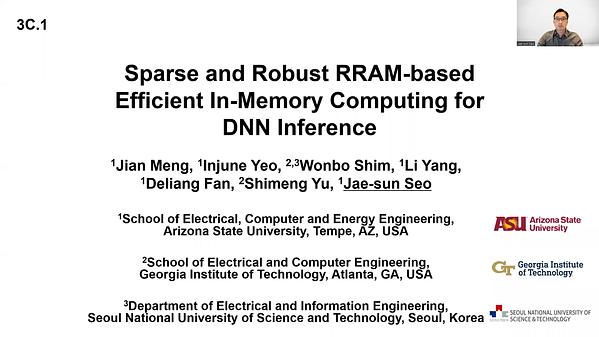Shimeng Yu
Georgia Institute of Technology, United States
fefet
rram
retention
ferroelectrics
non-volatile memory
ferroelectric
radiation
hysteresis
varactor
s-parameter
compute-in-memory
write-verify
adc reference generation
in-memory computing
deep neural networks
4
presentations
SHORT BIO
Shimeng Yu is a full professor of electrical and computer engineering at the Georgia Institute of Technology, where he holds the Dean's Professorship in the College of Engineering. He received the PhD degree from Stanford University in 2013. From 2013 to 2018, he was an assistant professor at Arizona State University. Prof. Yu’s research expertise is on the emerging non-volatile memories (e.g., RRAM, ferroelectrics) for different applications such as AI hardware, in-memory computing, 3D integration, etc. Among Prof. Yu’s honors, he was a recipient of the NSF Faculty Early CAREER Award in 2016, the IEEE Electron Devices Society (EDS) Early Career Award in 2017, the ACM Special Interests Group on Design Automation (SIGDA) Outstanding New Faculty Award in 2018, the Semiconductor Research Corporation (SRC) Young Faculty Award in 2019, and the ACM/IEEE Design Automation Conference (DAC) Under-40 Innovators Award in 2020, etc. Prof. Yu served or is serving many premier conferences as technical program committee, including IEEE International Electron Devices Meeting (IEDM), IEEE Symposium on VLSI Technology, ACM/IEEE Design Automation Conference (DAC), ACM/IEEE Design, Automation & Test in Europe (DATE), ACM/IEEE International Conference on Computer-Aided-Design (ICCAD), etc. He is a Fellow of the IEEE.
Presentations

Reliability Assessment of Ferroelectric nvCAP for Small-signal Capacitive Read-out
Omkar Phadke and 4 other authors

Experimental RF Characterization of Ferroelectric Hafnium Zirconium Oxide Material at GHz for Microwave Applications
Boce Lin and 4 other authors

Sparse and Robust RRAM-based Efficient In-memory Computing for DNN Inference
Jian Meng and 6 other authors

CAREER: Scaling-up Resistive Synaptic Arrays for Neuro-inspired Computing
Shimeng Yu